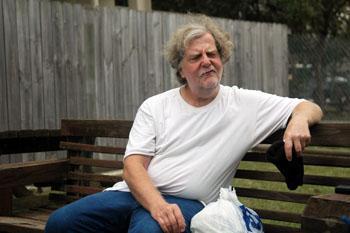Floyd Murrell sat in a plastic lawn chair outside the kitchen door waiting to begin his shift at the Society of St. Vincent de Paul’s dining hall. A job he feels blessed to have. Murrell is homeless but has been receiving support from the Catholic organization for the past seven or eight years. He said he came back to the shelter in January this year and was homeless before then.
“I went back out,” Murrell said. “I got to be homeless again.”Michael Acaldo, CEO for the society, said he and those at the shelter work to get people like Murrell back on track. But Baton Rouge is not seeing the decrease in homeless population reported by the U.S. Department of Housing and Urban Development in July.The U.S. had 12 percent fewer homeless on record for 2007 than it did in 2005, according to HUD’s report. Baton Rouge had a recorded 809 homeless in 2005, 807 in 2006 and 1,042 in 2007.Randy Nichols, executive director of Capital Area Alliance for the Homeless, said the numbers reflect the changes in how the numbers were taken and not a dramatic increase between 2006 and 2007.”We’ve improved our counting, so 2005 and 2006 show fewer homeless people,” Nichols said.Acaldo said Baton Rouge has not seen any substantial decrease in its homeless rate — a fact he credits to Hurricane Katrina and the economy.”After Katrina, the affordable housing was reduced,” Acaldo said. “As the economy has tightened up we see a lot of people who are living paycheck to paycheck, and they’re having trouble.”Murrell said he receives assistance through St. Vincent de Paul in the forms of lodging, food and work.There are two classifications of homelessness in the U.S. — chronic and temporary homelessness. The chronically homeless have some type of disabling condition like mental illness or addiction and are those who have been homeless multiple times over an extended period.
The temporary homeless are those that may be homeless because of a job loss, addiction or similar instance but are able to get out of the situation.The HUD report showed that of the 671,888 homeless in the U.S. only 123,833 were chronically homeless. Acaldo said urban areas have greater numbers of homelessness, and Louisiana has seen more homeless because of its low financial status.”We’re one of the poor states in the Union,” he said.The U.S. Census Bureau listed Louisiana as having 19 percent of its population below poverty level — the third largest percentage in the nation.”We’ve got the dislocation of [hurricanes] Katrina, Rita and Gustav,” Nichols said.The homeless rate is expected to rise this year, according to Nichols. He said FEMA subsidies will begin to run out, leading to more people without homes. Additionally, he said the current economic situation will only lead to more cases in Baton Rouge.
Acaldo expects Hurricane Gustav to have additional effects on the city.”I think it will be a gradual thing,” Acaldo said. “If they have damage, we’ll see an increase over time in individuals that can’t get it repaired.”The number of homeless women is on the rise, Acaldo said, because of their lack of college degrees.”Eight to 10 of [the men at the facility] have a high school degree or higher,” Acaldo said. “With the women two out of 10 have a high school diploma, and of that two out of 10 a lot of them have not had a job for an extended period of time.”Acaldo said societies like St. Vincent de Paul aim to get “people back on track and break the cycle of homelessness.”He said most people think someone who is homeless is the “person on the street corner.” But Acaldo said the people St. Vincent de Paul serves include the chronically and temporary homeless. He said the society aims to make sure the temporary homeless don’t become chronically homeless.—-Contact Sean Griffin at sgriffin@lsureveille.com
HUD report shows no decrease in BR homelessness
September 21, 2008

Floyd Murrell talks about his homeless experience last Monday at St. Vincent de Paul.



